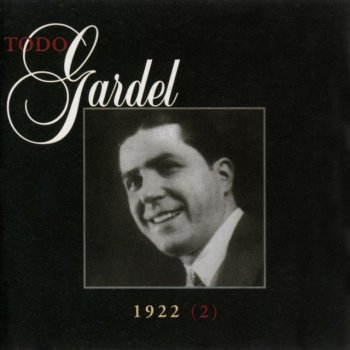Текст и перевод песни Carlos Gardel - Las Campanas
Las
campanas
(vals)
The
Bells
(waltz)
Letra
y
música
de
Planquette,
Robert
Jean
J.
Letra
y
musica
de
Planquette,
Robert
Jean
J.
Músico
y
compositor
francés
del
siglo
pasado.
Nació
en
París
el
31
de
marzo
de
1848
y
allí
falleció
el
28
de
enero
de
1903.
Con
la
música
del
vals
serenata
de
su
opereta
"La
Campanas
de
Corneville"
(Les
Cloches
de
Corneville),
Carlos
Gardel
en
castellano
grabó
"Las
Campanas".
El
disco
no
aclara
a
quién
pertenece
esta
letra.
French
musician
and
composer
of
the
last
century.
He
was
born
in
Paris
on
March
31,
1848
and
died
there
on
January
28,
1903.
With
the
music
of
the
serenade
waltz
from
his
operetta
"La
Campanas
de
Corneville"
(Les
Clocks
de
Corneville),
Carlos
Gardel
recorded
"Las
Campanas"
in
Spanish.
The
album
doesn't
make
it
clear
who
this
one
belongs
to
lyrics.
Vals
(10)
25
de
marzo
de
1922
(1922)
Waltz
(10)
March
25,
1922
(1922)
Número
de
la
prueba
matriz
de
la
casa
grabadora
758
Nº
de
orden
de
publicación
o
de
grabación
de
la
primera
aparición
del
título:
101.
Nº
secuencial
de
grabación:
107
Number
of
the
test
matrix
of
the
recording
house
758
No.
of
the
order
of
publication
or
recording
of
the
first
appearance
of
the
title:
101.
Sequential
recording
Nº:
107
Número
de
serie
del
disco
original
18048
Lado
B.
Duración
02'30"
Existe
otra
obra
de
Gardel
con
este
número
(Las
campanas
y
¿Dónde
estará?)
Serial
number
of
the
original
album
18048
Side
B.
Duration
02'30"
There
is
another
work
by
Gardel
with
this
number
(The
bells
and
Where
will
it
be?)
Gardel
acompañado
por
las
guitarras
de
José
"el
negro"
Ricardo,
"primera
guitarra"
quien
empezó
en
1916;
permaneció
13
años
con
Gardel
y
se
desvinculó
de
él
en
mayo
de
1929
en
forma
abrupta,
ya
que
resolvió
retornar
a
Buenos
Aires
y
Guillermo
Desiderio
Barbieri,
la
"segunda
guitarra",
el
"Negro"
Barbieri
era
el
más
antiguo
guitarrista
cuando
se
produjo
el
accidente
en
Medellín
(donde
murió).
Se
había
incorporado
en
1921,
cuando
aún
Gardel
actuaba
en
dúo
con
Razzano.
Gardel
lo
llamaba
"el
Barba",
fue
descubierto
en
la
ciudad
de
Lincoln,
en
la
provincia
de
Buenos
Aires,
en
el
transcurso
de
una
gira
del
dúo
Gardel-Razzano
por
el
interior
de
la
Argentina.
Gardel
accompanied
by
the
guitars
of
José
"el
negro"
Ricardo,
"first
guitar"
who
started
in
1916;
he
stayed
13
years
with
Gardel
and
parted
ways
with
him
in
May
1929
abruptly,
as
he
decided
to
return
to
Buenos
Aires
and
Guillermo
Desiderio
Barbieri,
the
"second
guitar",
the
"Negro"
Barbieri
was
the
older
guitarist
when
the
accident
occurred
in
Medellin
(where
he
died).
He
had
joined
in
1921,
when
Gardel
was
still
performing
in
a
duo
with
Razzano.
Gardel
called
him
"the
Beard",
he
was
discovered
in
the
city
of
Lincoln,
in
the
province
of
Buenos
Aires,
during
a
tour
of
the
Gardel-Razzano
duo
through
the
interior
of
Argentina.
Tema:
Sin
clasificación
posible.
Subject:
No
classification
possible.
De
mi
existencia
Of
my
existence
Con
los
albores
With
the
dawn
De
tus
rigores
Of
your
rigors
La
suerte
va.
Luck
goes.
Gozar
me
hizo
Enjoying
made
me
Todo
en
el
mundo
Everything
in
the
world
Del
mar
profundo
From
the
deep
sea
La
inmensidad.
The
immensity.
Cuando
las
olas
When
the
waves
Rugen
sin
calma
They
roar
without
calm
Abren
el
alma
They
open
the
soul
Del
bien.
Of
the
good.
Del
horizonte
From
the
horizon
Del
ancho
espacio
Of
the
wide
space
Es
el
palacio
It
is
the
palace
Que
habita
Dios.
That
God
dwells.
Así
he
vivido
This
is
how
I
have
lived
Desde
la
cuna
From
the
cradle
De
la
fortuna
Of
fortune
Tras
del
placer.
After
the
pleasure.
Hasta
que
un
día
Until
one
day
En
mi
camino
On
my
way
Puso
el
destino
He
put
the
fate
A
una
mujer.
To
a
woman.
Sobre
las
olas
On
the
waves
Del
manso
río
From
the
gentle
river
Su
cuerpo
frío
His
cold
body
Flotando
vi.
Floating
vi.
Y
entre
las
sombras
And
among
the
shadows
Desvanecidas
Vanished
Al
dar
la
vida
By
giving
life
Toda
perdí.
I
lost
everything.
Falsos
recuerdos
False
memories
Por
vez
postrera
For
the
last
time
Mi
vida
entera
My
whole
life
Tras
de
ella
irá.
He'll
go
after
her.
No
vuelva
a
verte,
Don't
ever
see
you
again,
Prenda
adorada,
Adored
garment,
Que
tu
mirada
That
your
gaze
Оцените перевод

1
Las Campanas
2 Un Bailongo
3 Contrastes (Duo Gardel-Razzano)
4 El Taita De Arrabal
5 Mi Ranchito
6 Chinita Linda (Duo Gardel-Razzano)
7 Pobre Corazoncito
8 Dos Cosas Te Pido (Duo Gardel-Razzano)
9 La Mascotita
10 Mi Pañuelo Bordao (Duo Gardel-Razzano)
11 La Cartita
12 Mi Estrella (Duo Gardel-Razzano)
13 Donde Estara (Duo Gardel-Razzano)
14 Heroico Paysandu (Duo Gardel-Razzano)
15 Los Indios
16 La Tropilla (Duo Gardel-Razzano)
17 EL Sapo Y La Comadreja (Duo Gardel-Razzano)
18 El Carretero (Duo Gardel-Razzano)
2 Un Bailongo
3 Contrastes (Duo Gardel-Razzano)
4 El Taita De Arrabal
5 Mi Ranchito
6 Chinita Linda (Duo Gardel-Razzano)
7 Pobre Corazoncito
8 Dos Cosas Te Pido (Duo Gardel-Razzano)
9 La Mascotita
10 Mi Pañuelo Bordao (Duo Gardel-Razzano)
11 La Cartita
12 Mi Estrella (Duo Gardel-Razzano)
13 Donde Estara (Duo Gardel-Razzano)
14 Heroico Paysandu (Duo Gardel-Razzano)
15 Los Indios
16 La Tropilla (Duo Gardel-Razzano)
17 EL Sapo Y La Comadreja (Duo Gardel-Razzano)
18 El Carretero (Duo Gardel-Razzano)
Внимание! Не стесняйтесь оставлять отзывы.